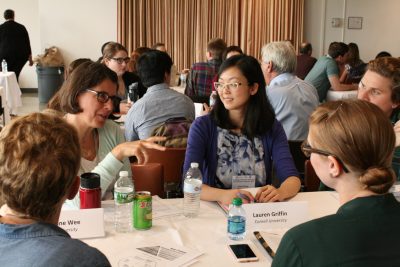Inaugural conference highlights innovations in teaching

June 12, 2017
At the inaugural Teaching as Research National Conference on June 6, scholars from across the country discussed how classroom research findings can be used to improve teaching techniques and learning outcomes.
One Cornell presenter, Allison Truhlar, PhD ‘17, spent a year as a teaching assistant observing students’ participation in unstructured online discussions and measuring how this participation affected their engagement with course content. She found that changing to a more directed, question-and-answer format better served the students—a discovery that will directly influence how she designs her courses in the future.
The conference, co-organized by the Center for Teaching Excellence (CTE) and Cornell University Center for the Integration of Research, Teaching, and Learning (CU-CIRTL), was previously known as the Classroom Research and Teaching Symposium and has now been expanded to include researchers and scholars nationwide.
In addition to Allison’s, there were 15 other oral presentations throughout the full-day conference, as well as 17 poster presentations, a roundtable session, and a keynote address. Presentation and discussion topics ranged from interactive learning techniques to supporting diversity and inclusion in the classroom to educational software programs. In addition to Cornell graduate students, postdocs, faculty, and staff, there were presenters and attendees from nearly 20 different universities.
“After five years hosting the Classroom Research and Teaching Symposium for the Cornell community, we are delighted to welcome scholars from around the country this year,” said Senior Vice Provost and Dean of the Graduate School Barbara Knuth, who offered opening remarks at the event. “By sharing our research experiences and knowledge with one another, we can strengthen our future faculty and work together with current faculty around course improvement projects.”
Knuth also noted the importance of the Graduate School’s partnership with CTE over the past several years, and the hard work and dedication of CTE Director Theresa Pettit, CTI Teaching Support Specialist Kimberly Williams, and CU-CIRTL Director Colleen McLinn to make this national conference a reality.
Keynote speaker Michelle K. Smith, associate professor of biological sciences at the University of Maine and C. Ann Merrifield Professor in Life Science Education, presented on how certain assessment tools can help faculty make instructional decisions, and how student data collected from these tools have inspired faculty from several institutions to share data on student learning with one another and create additional assessment opportunities to learn more about student thinking. Smith will be in residence at Cornell during the 2017-2018 academic year for a sabbatical research program.
The deadline to apply for this fall’s Scholarship of Teaching and Learning Practicum—an accelerated program during which participants design and conduct pilot teaching as research projects and present them at the next Teaching as Research Conference—is September 1. Those interested in a more comprehensive training in Teaching as Research including coursework can apply for the Graduate Research and Teaching Fellowship program, with applications due on a rolling basis until August 1.
View the Flickr album from this event here.
Sally Kral is a communications and outreach assistant in the Graduate School


